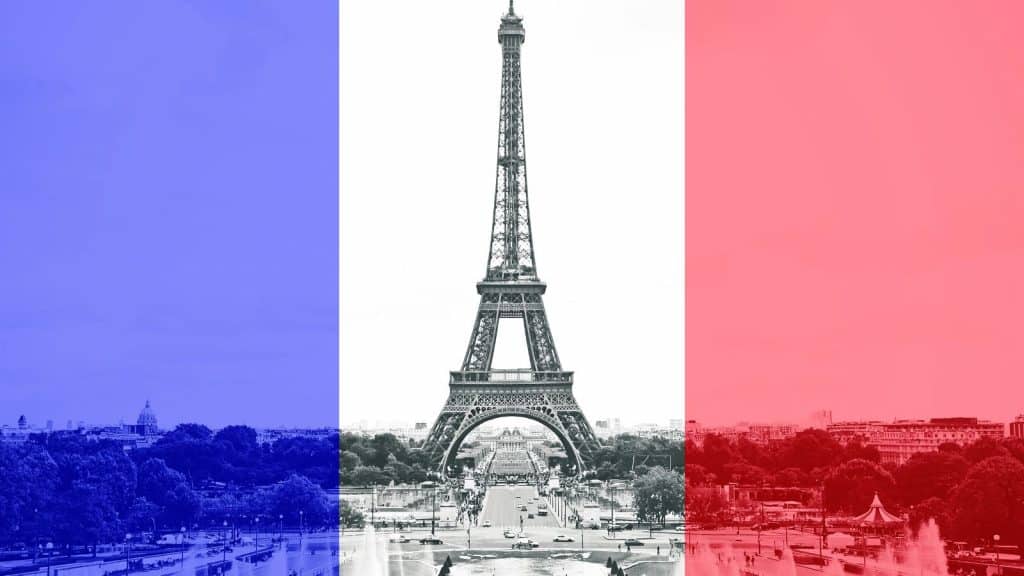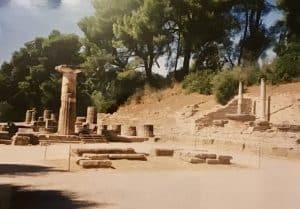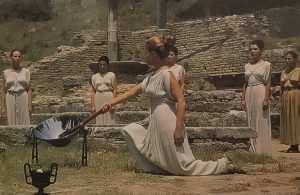Call free on: 0800 389 2839
Call free on: 0800 389 2839
Join in... The latest news and blogs from NEC
The Classical History of the Olympic Games: From Ancient Greece to Paris 2024 Thursday, 25 July 2024

Written by NEC Marketing Manager, Amanda Davies
The Olympic Games has a rich history dating back to antiquity that offers insights into the culture of Ancient Greece and the evolution of the Modern Olympics.
The Modern Olympics: Paris 2024
The 33rd Summer Olympic Games of the Modern Olympic period will begin in Paris on Friday, 26th July 2024. Over two weeks, around 10,500 athletes representing 206 countries will compete for a total of 987 medals across 329 events.
Paris 2024 will be the first time in one hundred years that the Modern Olympic Games has been held in Paris.
Visiting Ancient Olympia
In the lead-up to the Athens Olympic Games of 2004 I visited Olympia, the site of the Ancient Olympic Games, to find out more about their history.
The Ancient Olympics: 776 BC to 393 AD
The first known Olympic Games were held more than 2,700 years ago in the summer of 776 BC at Olympia in Southern Greece. People visited this site to worship their gods. Every four years, known as an Olympiad, around 50,000 people came from all over Greece to participate in the Olympic festival. The Ancient Greek people counted time in Olympiads rather than in years.
Participation and Training
The Games were very prestigious and competitors travelled thousands of miles to attend. Only men, boys and unmarried girls were allowed at the Ancient Games, and only Greek men could compete.
Athletes trained together in different gymnasiums around Olympia, the original Olympic Village! They competed naked with their bodies covered in oil.
Accolades for Winners and Losers
Plinths lined the entrance to the Olympic arena. Statues of competition winners stood on the right, while statues of athletes who had cheated stood on the left. This was to discourage further cheating. Winners returned home as heroes and had everything provided for the rest of their lives, whilst cheats were ostracised and their villages had to pay a penalty.

The First Olympic Champion
The original Olympic motto, Citius – Altius – Fortius (Faster – Higher – Stronger), was embodied by Coroebus of Elis, the first champion of the Ancient Olympic Games. In 776 BC he won the stadion race, a foot race over 600 feet (183 metres).
The End of the Ancient Olympic Games
The Ancient Olympics ended when the Roman Emperor Theodosius I banned the Games in 393 AD to promote Christianity when Greece became part of the Byzantine Empire.
The Games did not return for 1,503 years.
The Birth of the Modern Olympics
Inspired by the Ancient Olympics, the Modern Olympic Games were founded by Frenchman Baron Pierre de Coubertin. In 1894 the International Olympic Committee (IOC) was established, with the belief that “sport can contribute to the harmonious development of humankind”.
One-hundred and thirty years later the IOC’s vision is to “Build a Better World through Sport”, working on a daily basis to use sport to promote peace and the Olympic values of Excellence, Respect and Friendship, around the world.
The First Modern Olympic Games
The first Modern Olympics Games was held in Athens in 1896, when around 280 male athletes from 12 countries participated. The second games, held four years later in Paris, was the first time that women competed.
American triple jumper James Connolly became the first Olympic champion of the Modern Olympics, winning Olympic Gold in April 1896.
Hosting the Modern Olympic Games
Since 1896, 20 countries have hosted the Summer Olympic Games, whilst 13 have hosted the Winter Olympics. Learn more about the Games on the official Olympics website.
Differences between the Ancient and Modern Olympic Games
- Purpose: The Ancient Olympics were part of a religious festival honouring Zeus, the King of the Greek gods. The Temple of Zeus at Olympia housed a 12 metre high gold and ivory statue of Zeus. It was one of the Seven Wonders of the Ancient World. The Modern Olympics celebrates athletes from around the globe.
- Events: The Ancient Olympics featured six sports. The Paris 2024 Olympics will feature 32 sports.
- Participants: Initially only free born Greek men were allowed to participate in the Ancient Olympic Games. Today, athletes from around the world, including women, take part.
- Rewards: Ancient winners received a wreath made of olive leaves, called a Kotinos, gathered from a sacred wild olive tree in Olympia. Modern Olympic champions win medals.
- Women: Unmarried women held their own festival at Olympia, the Heraean Games, to honour Zeus’ wife Hera. Today, the mens and womens competition takes place at the same time.
The official Olympics website includes 10 favourite facts about the Ancient Olympic Games.
Recognisable Symbols of the Modern Olympics
The Five Olympic Rings
Created by Baron Pierre de Coubertin in 1913, the five rings combined represented the colours of the flags of all nations competing in the Olympic Games at that time.
“These five rings represent the five parts of the world now won over to the cause of olympism … what is more, the six colours thus combined reproduce those of all nations without exception.” – Pierre de Coubertin, Founder of the Olympic Movement

The Olympic Flame
First appearing at the Berlin Games in 1936, the Olympic Flame symbolises the spirit of the Olympics, linking the Modern Games to their ancient origins when fire was considered a divine element.
To link the Ancient and the Modern Olympic Games, the flame is lit at Olympia using the rays of the sun.
Prior to the commencement of the Olympic Games the flame travels around Greece and the host country before entering the Olympic Stadium and lighting the flame of a giant cauldron. The Games can then begin.
The flame will burn continuously until the closing ceremony when it is extinguished.

Studying the Classical World and the Ancient Olympics
Studying the classical world offers valuable insights into the origins of the Olympic Games.
The Open University offers a free course, “The Ancient Olympics: Bridging Past and Present”, highlighting the similarities and differences between the Ancient and Modern Olympics.
In this blog post from 2023 Gráinne Cassidy, Education Co-ordinator at The Classical Association explains what we can learn from studying the classical world.
A level Classical Civilisation
If you are inspired to learn more about the classical world, NEC offers an A level in Classical Civilisation. Claire studied A level Classical Civilisation with NEC after being awarded a bursary by The Classical Association:
“Classics gives you another filter and another lens to look through; another way of seeing things. That’s really exciting.
“It’s really interesting and it’s great to be a student again. I really enjoy the self-directed and self-paced study but also like the idea of that sense of there’s a bit more to it and I’m immersing myself in that world.
“What’s really helpful about distance learning is the flexibility, it removes stress over deadlines.”
Find out more about NEC’s A level Classical Civilisation course here.
Interested in a career in sport?
If you need to fit your academic study around training and participating in sporting activity, or if you are setting up a business working with sports people you may be interested in our other courses. We offer a choice of 17 GCSE subjects and 21 A level subjects, including English language, maths, biology and other sciences.
See our full range of online courses here.
Why not try our FREE course A Guide to AI and see how online distance learning fits around your schedule.
Conclusion
Celebrating athletic excellence and bringing together people from all over the world, the Paris 2024 Olympics takes place from 26th July to 11th August 2024. Visit the Paris 2024 website for more information.
More stories
working at NEC
Uncategorized
- Balancing an A level with My Passion for Dance
- The Future of Art History: Why Study A level History of Art with the National Extension College?
- Why Study Physics?
- Embracing a New Path: Jill’s Journey from Online Learning to Career Success in Art History
- How Toby Found a Perfect Fit for His Passion: Online A level English Literature with NEC
Study Tips
Student Stories
- Balancing an A level with My Passion for Dance
- Passion and Academics: How Izzy Balances Full-time Musical Theatre Studies with Studying A level Physics
- How NEC Helped Kari’s Son Niko to Continue his A level Studies Despite Long-Term Illness
- Embracing a New Path: Jill’s Journey from Online Learning to Career Success in Art History
- How Toby Found a Perfect Fit for His Passion: Online A level English Literature with NEC
SFT
Results Day
- Resitting A level STEM Subjects: How to Turn Your Setback into a Stepping Stone for a Brighter Future
- Resits vs. Retakes: Understanding the Difference and Making the Most of Your Second Chance
- GCSE Results Day 2024: What to Do When You Didn’t Get the GCSE Results You Wanted
- GCSE Results Day 2024: Your Complete Guide
- A level Results Day 2024: Your Ultimate Guide to Success
Policy and Campaigns
- A Pathway to Success Beyond A levels: Why Level 4 and Level 5 Qualifications Matter
- Schools and Academies Show 2024: Insights for School Leaders
- Big Data and Educational Trends: Insights for Students and Schools
- University of Cambridge Institute of Continuing Education offers tuition fee bursary for NEC A level students
- Five study bursaries for state sector teachers to take online A level Classical Civilisation offered by The Classical Association
Podcast
Our Courses
- Balancing an A level with My Passion for Dance
- How NEC’s Inclusive Approach to Learning Design is Redefining Independent Learning
- NEC’s Learning Design: A Pathway to Success for Independent Learners
- Passion and Academics: How Izzy Balances Full-time Musical Theatre Studies with Studying A level Physics
- Why Study Psychology? – Key Benefits, Careers and What You’ll Need to Study Psychology at University
Lifelong Learning
- A Pathway to Success Beyond A levels: Why Level 4 and Level 5 Qualifications Matter
- Benefits of Homeschooling: Is Home Education Right for Your Family?
- How NEC’s Inclusive Approach to Learning Design is Redefining Independent Learning
- The Future of Art History: Why Study A level History of Art with the National Extension College?
- National Coding Week 2024: The Vital Role of Coding in the Modern World
Home Schooling
- Benefits of Homeschooling: Is Home Education Right for Your Family?
- How NEC Helped Kari’s Son Niko to Continue his A level Studies Despite Long-Term Illness
- Exploring Science Practicals at Home: A Guide for Homeschoolers
- Homeschooling in 2024: How to Personalise Your Child’s Education
- What is Homeschooling?
Guest Blogs
- Passion and Academics: How Izzy Balances Full-time Musical Theatre Studies with Studying A level Physics
- My Experience as a Marketing Intern with the National Extension College
- The economics of political parties
- Embarking on a journey: My decision to ‘Fast-Track’ A level Physics with NEC
- Homeschooler Andrew’s experience of studying IGCSE Chemistry
General
- Balancing an A level with My Passion for Dance
- A Pathway to Success Beyond A levels: Why Level 4 and Level 5 Qualifications Matter
- Schools and Academies Show 2024: Insights for School Leaders
- How NEC’s Inclusive Approach to Learning Design is Redefining Independent Learning
- NEC’s Learning Design: A Pathway to Success for Independent Learners

Add a new comment
Current comments: 0